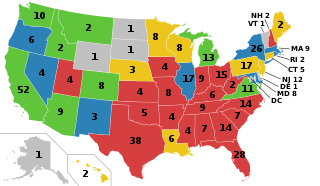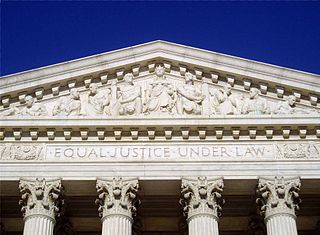
The Fourteenth Amendment to the United States Constitution was adopted on July 9, 1868, as one of the Reconstruction Amendments. Often considered as one of the most consequential amendments, it addresses citizenship rights and equal protection under the law and was proposed in response to issues related to former slaves following the American Civil War. The amendment was bitterly contested, particularly by the states of the defeated Confederacy, which were forced to ratify it in order to regain representation in Congress. The amendment, particularly its first section, is one of the most litigated parts of the Constitution, forming the basis for landmark Supreme Court decisions such as Brown v. Board of Education (1954) regarding racial segregation, Roe v. Wade (1973) regarding abortion, Bush v. Gore (2000) regarding the 2000 presidential election, and Obergefell v. Hodges (2015) regarding same-sex marriage. The amendment limits the actions of all state and local officials, and also those acting on behalf of such officials.

The Equal Rights Amendment (ERA) is a proposed amendment to the United States Constitution designed to guarantee equal legal rights for all American citizens regardless of sex. Proponents assert it would end legal distinctions between men and women in matters of divorce, property, employment, and other matters. The first version of an ERA was written by Alice Paul and Crystal Eastman and introduced in Congress in December 1923.

The federal government of the United States is the national government of the United States, a federal republic in North America, composed of 50 states, a city within a federal district, five major self-governing territories and several island possessions. The federal government, sometimes simply referred to as Washington, is composed of three distinct branches: legislative, executive, and judicial, whose powers are vested by the U.S. Constitution in the Congress, the president and the federal courts, respectively. The powers and duties of these branches are further defined by acts of Congress, including the creation of executive departments and courts inferior to the Supreme Court.
United States v. Morrison, 529 U.S. 598 (2000), is a U.S. Supreme Court decision that held that parts of the Violence Against Women Act of 1994 were unconstitutional because they exceeded the powers granted to the US Congress under the Commerce Clause and the Fourteenth Amendment's Equal Protection Clause. Along with United States v. Lopez (1995), it was part of a series of Rehnquist Court cases that limited Congress's powers under the Commerce Clause.

The Georgetown University Law Center is the law school of Georgetown University, a private research university in Washington, D.C. It was established in 1870 and is the second-largest law school in the United States by enrollment, receiving more full-time applications than any other law school in the country.
The Equal Protection Clause is part of the first section of the Fourteenth Amendment to the United States Constitution. The clause, which took effect in 1868, provides "nor shall any State ... deny to any person within its jurisdiction the equal protection of the laws". It mandates that individuals in similar situations be treated equally by the law.

The Tahirih Justice Center, or Tahirih, is a national charitable non-governmental organization headquartered in Falls Church, Virginia, United States that aims to protect immigrant women and girls fleeing gender-based violence and persecution. Tahirih's holistic model combines free legal services and social services case management with public policy advocacy, training and education.

The Brennan Center for Justice at New York University School of Law is a nonprofit law and public policy institute. The organization is named after Supreme Court Justice William J. Brennan Jr. Generally considered liberal, the Brennan Center advocates for a number of progressive public policy positions, including raising the minimum wage, opposing voter ID laws, and calling for public funding of elections. The organization opposed the U.S. Supreme Court's ruling in Citizens United v. FEC, which held that the First Amendment prohibits the government from restricting independent political expenditures by nonprofits.
Nevada Department of Human Resources v. Hibbs, 538 U.S. 721 (2003), was a United States Supreme Court case which held that the Family and Medical Leave Act of 1993 was "narrowly targeted" at "sex-based overgeneralization" and was thus a "valid exercise of [congressional] power under Section 5 of the Fourteenth Amendment."
In United States law, habeas corpus is a recourse challenging the reasons or conditions of a person's detention under color of law. The Guantanamo Bay detention camp is a United States military prison located within Guantanamo Bay Naval Base. A persistent standard of indefinite detention without trial and incidents of torture led the operations of the Guantanamo Bay detention camp to be challenged internationally as an affront to international human rights, and challenged domestically as a violation of the Due Process Clause of the Fifth and Fourteenth amendments of the United States Constitution, including the right of petition for habeas corpus. In 19 February 2002, Guantanamo detainees petitioned in federal court for a writ of habeas corpus to review the legality of their detention.
Pro se legal representation comes from Latin pro se, meaning "for oneself" or "on behalf of themselves", which in modern law means to argue on one's own behalf in a legal proceeding as a defendant or plaintiff in civil cases or a defendant in criminal cases, rather than have counsel or an attorney do it for you.
Legal aid in the United States is the provision of assistance to people who are unable to afford legal representation and access to the court system in the United States. In the US, legal aid provisions are different for criminal law and civil law. Criminal legal aid with legal representation is guaranteed to defendants under criminal prosecution who cannot afford to hire an attorney. Civil legal aid is not guaranteed under federal law, but is provided by a variety of public interest law firms and community legal clinics for free or at reduced cost. Other forms of civil legal aid are available through federally-funded legal services, pro bono lawyers, and private volunteers.
Human rights in the United States comprise a series of rights which are legally protected by the Constitution of the United States, state constitutions, treaty and customary international law, legislation enacted by Congress and state legislatures, and state referenda and citizen's initiatives. The Federal Government has, through a ratified constitution, guaranteed unalienable rights to its citizens and non-citizens. These rights have evolved over time through constitutional amendments, legislation, and judicial precedent. Along with the rights themselves, the portion of the population granted these rights has expanded over time. Within the United States, federal courts have jurisdiction over international human rights laws.

The National Association for the Advancement of Colored People (NAACP) is a civil rights organization in the United States, formed in 1909 as an interracial endeavor to advance justice for African Americans by a group including W. E. B. Du Bois, Mary White Ovington, Moorfield Storey and Ida B. Wells. Leaders of the organization included Thurgood Marshall and Roy Wilkins.
Victims' rights are legal rights afforded to victims of crime. These may include the right to restitution, the right to a victims' advocate, the right not to be excluded from criminal justice proceedings, and the right to speak at criminal justice proceedings.
The Women's Liberation Front (WoLF) is an American organization known for its opposition to transgender rights and gender identity legislation. WoLF describes itself as a radical feminist organization that works to protect women and girls from what they view as the "risks posed by both 'gender identity' policies and the decriminalization of pimping and sex buying". It has engaged in litigation on transgender topics, working against the Obama administration's Title IX directives which defined sex discrimination to include gender identity. It has been characterized by Vox, The New Republic, and La Presse as a "trans-exclusionary radical feminist" group.

Gerrymandering in the United States has been used to increase the power of a political party. Gerrymandering is the practice of setting boundaries of electoral districts to favor specific political interests within legislative bodies, often resulting in districts with convoluted, winding boundaries rather than compact areas. The term "gerrymandering" was coined after a review of Massachusetts's redistricting maps of 1812 set by Governor Elbridge Gerry noted that one of the districts looked like a salamander.
The Equal Justice Initiative (EJI) is a non-profit organization, based in Montgomery, Alabama, that provides legal representation to prisoners who may have been wrongly convicted of crimes, poor prisoners without effective representation, and others who may have been denied a fair trial. It guarantees the defense of anyone in Alabama in a death penalty case.

Equal Justice Under Law is an American civil rights impact litigation nonprofit based in Washington, D.C., which accepts cases on a national basis. The organization was founded in 2014 by Alec Karakatsanis and Phil Telfeyan, two 2008 Harvard Law School graduates. The mission of Equal Justice Under Law is to achieve equality in the criminal system and break cycles of poverty for those involved with the legal system. The organization works on a range of issues, including money bail, fees for expungement, and suspension of driver's licenses. Equal Justice Under Law and its small team of lawyers seek to drive change in the legal system through impact litigation and class action lawsuits. The firm's work has received national attention in news outlets including The New York Times, The Washington Post, National Public Radio, USA Today, the San Francisco Chronicle, the Detroit Free Press, in addition to strong local coverage of its lawsuits.
Criminal justice reform addresses structural issues in criminal justice systems such as racial profiling, police brutality, overcriminalization, mass incarceration, and recidivism. Criminal justice reform can take place at any point where the criminal justice system intervenes in citizens’ lives, including lawmaking, policing, and sentencing.






